| Srl | Item |
| 1 |
ID:
161056
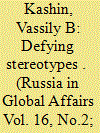

|
|
|
|
|
| Summary/Abstract |
n this article the author probes into how the Democratic People’s Republic of Korea and its political regime managed to survive in defiance of internal economic problems and external political, economic and military pressures it experienced since 1991. Comparison of the available statistics illustrating North Korea’s economic and internal political situation, as well as pressure methods and tactics used on a smaller scale against a far stronger country, the Soviet Union, during the Cold War, allows for taking a fresh look at the effectiveness of foreign policy instruments the United States created during its confrontation with the Soviet Union. Consolidation of the country’s ruling elite amid foreign pressures and exposure to external threats are identified as factors that play the decisive role in determining the outcome of the standoff. The effectiveness of pressure strategies apparently depends on this factor
|
|
|
|
|
|
|
|
|
|
|
|
|
|
|
|
| 2 |
ID:
152599
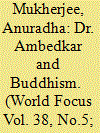

|
|
|
|
|
| Summary/Abstract |
Ambedkar was convinced that conversion will draw the Dalits out of their isolation. To him, Buddhism as a philosophy based on justice and not on the salvation of the soul could be the right religion for the Dalits. It was not meant to be an escape but a collective revolt that also , made a significant step in the resurgence of Buddhism in the country of its origin in all the glory of the humanity it preached.
|
|
|
|
|
|
|
|
|
|
|
|
|
|
|
|
| 3 |
ID:
088669


|
|
|
| 4 |
ID:
074526


|
|
|
| 5 |
ID:
125533


|
|
|
|
|
| Publication |
2013.
|
| Summary/Abstract |
No civilization during the course of its development has ever been free from the influence of another civilization. That is to say that no civilization developed in isolation. Geographical barriers or unfriendly topography could not obstruct man's passion for exploration and development.
|
|
|
|
|
|
|
|
|
|
|
|
|
|
|
|
| 6 |
ID:
156991


|
|
|
|
|
| Summary/Abstract |
The Belt and Road Initiative is gradually moving China and its economy beyond the reach of Western sanctions and reducing the economic impact that a US naval blockade could have. Christer Ljungwall and Viking Bohman contend that, without a measured Western response, this could increase the likelihood of Chinese aggression in regional territorial disputes.
|
|
|
|
|
|
|
|
|
|
|
|
|
|
|
|
| 7 |
ID:
075670


|
|
|
| 8 |
ID:
183784
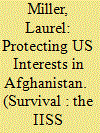

|
|
|
|
|
| Summary/Abstract |
It is unrealistic to expect the Taliban regime to provide Afghanistan with a representative government that respects human rights in line with American preferences, or to constitute a strong security partner for the United States. But Washington still has choices about the relationship it can have with Kabul. The US government should move beyond its post-withdrawal hybrid policy of isolation and limited engagement – essentially, no relationship beyond occasional ad hoc problem-solving – to one that is better able to protect US interests in the region. These include preventing Afghanistan from becoming a base for transnational terrorist groups, securing the departure of Afghans at risk due to their association with the US occupation, and tamping down anti-Western sentiment. A bilateral relationship that establishes routine US diplomatic engagement, a development-assistance programme and tailored sanctions is required.
|
|
|
|
|
|
|
|
|
|
|
|
|
|
|
|
| 9 |
ID:
134043
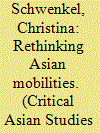

|
|
|
|
|
| Publication |
2014.
|
| Summary/Abstract |
Vietnam's economic reforms have generated much praise for the country's rapid "opening" of its markets, as if the Vietnamese nation had previously existed in a state of isolation, closed to broader global influences and exchanges. Such discourses overlook the importance of transnational circulations of people, goods, technologies, and expertise during the socialist era that were vital to Vietnam's postwar national reconstruction and continue to play a role in post-socialist economic transformation today. This article traces the socialist pathways of labor migration between Vietnam and the former Soviet Bloc (specifically, East Germany) in the 1980s, mobilities that are generally absent in studies of contemporary export labor industries. Based on multi-sited ethnographic and archival research, the author follows Vietnamese workers first to the East German factories where they labored as "contract workers," and then through their subsequent return and reintegration into Vietnamese society after the collapse of the Soviet Union. These mobilities bespeak of an alternative history and formation of diasporic communities that are little acknowledged or addressed in literature on labor migrations, and yet are important to understanding emerging forms of stratification today in Vietnam. Moreover, an analysis of early non-capitalist experiences with overseas labor regimes in the 1980s provides insights into contemporary Vietnamese governance practices that promote-rather uncritically, similar to other "emerging countries" -export labor as a nation-building strategy to reduce endemic poverty and develop a late socialist country.
|
|
|
|
|
|
|
|
|
|
|
|
|
|
|
|
| 10 |
ID:
173127


|
|
|
|
|
| Summary/Abstract |
On April 5, 2018 Saudi Arabia announced the Salwa Canal project to inaugurate a new generation of shipping canals that has nothing to do with advancing maritime navigation, but rather for changing Qatar's geography and isolating it. If executed as planned, the Salwa Canal would be built completely on Saudi territory 1 km from its border with the Qatar peninsula. The latter would see its only land border disappear and turn the State of Qatar into an island State. The following questions arise: insofar as international law is concerned, would Saudi Arabia be within its rights to execute this project? Would Qatar have a legal case in international forums to halt the project on grounds that its geography would be adversely impacted? On another level, would Qatar, as the injured State, be able to refer the matter to the International Court of Justice to discuss possible environmental damage? What impacts does this project, if executed, have on other possible cases such as Malaysia, should Thailand decide to construct a canal that would connect the province of Satun with the gulf of Thailand and Songkhla province to directly access the Strait of Malacca, or on the claimed city of Gibraltar, if Spain decides to connect the Bay of Algeciras with the Alboran Sea via a sea canal? This article attempts to shed some light on such novel matters in light of the Salwa Canal project and its legal impacts under international law.
|
|
|
|
|
|
|
|
|
|
|
|
|
|
|
|
| 11 |
ID:
155086
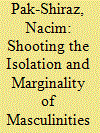

|
|
|
|
|
| Summary/Abstract |
This article examines the isolation and marginality of Iranian men living in contemporary Iran with a focus on three post-2005 films. As a patriarchal society, Iran has been the subject of many studies on the subjugation and marginality of women. This study demonstrates how recent Iranian films have skillfully employed the cinematic language to narrate men’s stories of alienation and despair. These filmic constructions provide a valuable and complex insight into masculine identities, challenging perceptions of the essentialized image of the Middle Eastern male. By employing Connell’s hierarchy of masculinities, the article demonstrates the position of marginalized men in relation to the dominant ideals of masculinity and the influence of these discourses on the lives of such men. The films discussed here do not perpetuate the construction of the ‘true’ gender, but instead challenge ideas of heroism, manliness and patriarchy.
|
|
|
|
|
|
|
|
|
|
|
|
|
|
|
|
| 12 |
ID:
098370
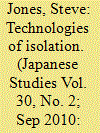

|
|
|
|
|
| Publication |
2010.
|
| Summary/Abstract |
In this investigation of the Japanese film Kairo, I contemplate how the horrors present in the film relate to the issue of self, by examining a number of interlocking motifs. These include thematic foci on disease and technology which are more intimately and inwardly focused that the film's conclusion first appears to suggest. The true horror here, I argue, is ontological: centred on the self and its divorcing from the exterior world, especially founded in an increased use of and reliance on communicative technologies. I contend that these concerns are manifested in Kairo by presenting the spread of technology as disease-like, infecting the city and the individuals who are isolated and imprisoned by their urban environment. Finally, I investigate the meanings of the apocalypse, expounding how it may be read as hopeful for the future rather than indicative of failure or doom.
|
|
|
|
|
|
|
|
|
|
|
|
|
|
|
|